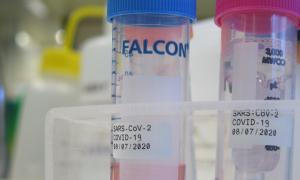IrsiCaixa publishes a list of molecules found in SARS-CoV-2 to advance the study of long-term immunity against the virus

IrsiCaixa researchers have analysed sequences of the genome of 1700 coronavirus SARS-CoV-2 currently circulating around the world and have defined the first consensus sequence of the virus, from which they have been able to list 3000 peptides –small protein fragments– which may activate long-term immunity against the virus
The health emergency has led the scientific community to make a great effort to understand the immune response against the virus in record time, but there are still many gaps to be filled. Now, a study led by IrsiCaixa, a centre jointly supported by "la Caixa" Foundation and the Catalan Government's Health Department, and funded by the #YoMeCorono fundraising campaign, Grifols and the Carlos III Health Institute, describes the first consensus genetic sequence of SARS-CoV-2, a representative sequence of the entire genome of 1700 viruses. From this sequence they have been able to list between 1500 and 3000 peptides - small protein fragments - which are used to study to the maximum detail the immune response of T cells against coronavirus.
This article has been published in Open Access in Vaccines journal. "This is a key tool for the analysis of the immune response that will allow us to accelerate the research and development of a vaccine, that is why we had to make it accessible to everyone," stress the study leaders, Christian Brander and Julia G. Prado, IrsiCaixa’s Principal Investigators in the Host Genetics and Cellular Immunity group and the Viral Immune Evasion and Vaccines group, respectively.
The immune system is responsible for protecting our bodies from pathogens such as viruses. One of the mechanisms when detecting a virus is the acquired immune response, which includes the so-called antibodies, able to neutralize the virus, and the T cells, able to identify and destroy the virus-infected cells of our body. This T-cell action is known as cellular immunity, is persistent over time and works as a reminder of future infections. "Detecting whether a cellular immune response has been triggered is complicated, since we need to know which parts of the coronavirus activate the T cells", explains IrsiCaixa associate researcher Alex Olvera, first author of the article together with associate researcher Marc Noguera-Julian. Until now, the published studies have focused either on some viral proteins or on unique sequences of the virus. "We did not want to miss a part of the immune response that seems to be key in the generation of the immune memory against the virus. That is why we have designed this tool, a list of molecules that allows us to take into account the complete genome of the virus and its capacity for variation", adds Noguera-Julian.
Thousands of peptides to study cellular immunity against SARS-CoV-2
Researchers have compared the complete sequences of 1700 SARS-CoV-2 genomes circulating around the world and available on public online platforms. Through the analysis of all these data they have been able to define a representative genetic sequence of the virus, as well as to obtain a list of all the possible protein fragments that the virus can produce.
"We have noticed that SARS-CoV-2 does not mutate much and is not a virus with a lot of genetic variability, unlike HIV for example, but we have to take into account what the possible variants are in order to study the immune response that will be generated against each of the viruses and not miss any details," says Olvera. In addition, they have detected that some of the peptides are highly conserved among several viruses of the coronavirus family. "This could be the key to generating a cross-reaction, that is, an immune response capable of protecting against both the common cold virus and SARS-CoV-2," explains Noguera-Julian.
A tool to speed up research
This tool allows IrsiCaixa researchers to study cellular immunity against SARS-CoV-2. "We want to understand which immune response is behind people that do not generate antibodies against the virus and get through the SARS-CoV-2 infection with little clinical symptoms and which peptides are capable of inducing this response", says G. Prado. In addition, "the widespread use of this consensus sequence in immune system research against SARS-CoV-2 will ensure comparability and reproducibility of results between laboratories and this will greatly accelerate the research process," concludes Brander.